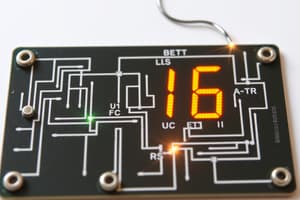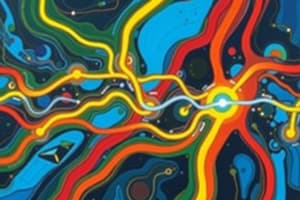Podcast
Questions and Answers
What is the expression for current i(t) for t > 0 in the given circuit element?
What is the expression for current i(t) for t > 0 in the given circuit element?
- 0 A
- 200e^{100t} A
- 200e^{-100t} A (correct)
- 20e^{-100t} A
For which time interval is the current i(t) equal to zero?
For which time interval is the current i(t) equal to zero?
- t < 0 (correct)
- t > 0
- t = 10 ms
- t = 0
What is the charge q(t) at t = 0?
What is the charge q(t) at t = 0?
- 0 C (correct)
- 1 C
- 2 C
- 2 - 2e^{-100*0} C
What does the variable t represent in the context of this circuit analysis?
What does the variable t represent in the context of this circuit analysis?
How does the charge q(t) behave as time increases indefinitely?
How does the charge q(t) behave as time increases indefinitely?
Which graph correctly represents the relationship between charge q(t) and time?
Which graph correctly represents the relationship between charge q(t) and time?
What is the unit of measure for current i(t) in this circuit analysis?
What is the unit of measure for current i(t) in this circuit analysis?
What will be the charge q(t) at t = 10 ms?
What will be the charge q(t) at t = 10 ms?
What is the energy transferred when a positive charge of 2 C moves through a circuit element with a voltage of 20 V?
What is the energy transferred when a positive charge of 2 C moves through a circuit element with a voltage of 20 V?
In a passive reference configuration, what does a positive power calculation indicate?
In a passive reference configuration, what does a positive power calculation indicate?
How is power related to current and voltage in a circuit?
How is power related to current and voltage in a circuit?
When a circuit element supplies energy, what type of power result is observed?
When a circuit element supplies energy, what type of power result is observed?
What are the physical units of power as derived from the equation p = vi?
What are the physical units of power as derived from the equation p = vi?
A charge moves through a circuit element from a lower voltage terminal to a higher voltage terminal. What happens to energy?
A charge moves through a circuit element from a lower voltage terminal to a higher voltage terminal. What happens to energy?
If a circuit element has a voltage of 10 V and a current of 3 A, what is the power across the element?
If a circuit element has a voltage of 10 V and a current of 3 A, what is the power across the element?
Which statement correctly defines the relationship between voltage, current, and energy transfer?
Which statement correctly defines the relationship between voltage, current, and energy transfer?
What does the notation iab represent in the context of circuit elements?
What does the notation iab represent in the context of circuit elements?
If iab represents a current flowing from a to b, what is the relationship between iab and iba?
If iab represents a current flowing from a to b, what is the relationship between iab and iba?
What happens to the sign of the current when the reference direction is reversed?
What happens to the sign of the current when the reference direction is reversed?
How is the reference direction for a current defined in double-subscript notation?
How is the reference direction for a current defined in double-subscript notation?
Which of the following statements is true regarding the currents iab and iba?
Which of the following statements is true regarding the currents iab and iba?
If a constant current of 2 A flows through a circuit element, which of the following currents could be represented by this situation?
If a constant current of 2 A flows through a circuit element, which of the following currents could be represented by this situation?
Which of the following best illustrates the concept of double-subscript notation?
Which of the following best illustrates the concept of double-subscript notation?
When using double-subscript notation, what does a negative sign in front of a current value indicate?
When using double-subscript notation, what does a negative sign in front of a current value indicate?
What primarily determines the voltage of a voltage-controlled voltage source?
What primarily determines the voltage of a voltage-controlled voltage source?
If the voltage vx across a terminal is 4 V in a voltage-controlled voltage source with a constant of 2, what is the output voltage?
If the voltage vx across a terminal is 4 V in a voltage-controlled voltage source with a constant of 2, what is the output voltage?
What does Kirchhoff's current law state about the net current at a node in a circuit?
What does Kirchhoff's current law state about the net current at a node in a circuit?
In the statement of Kirchhoff’s current law, what does it imply if only two circuit elements are connected at a node?
In the statement of Kirchhoff’s current law, what does it imply if only two circuit elements are connected at a node?
What type of symbol represents voltage-controlled voltage sources in diagrams?
What type of symbol represents voltage-controlled voltage sources in diagrams?
What conclusion can be drawn from the equation for Node a: i1 + i2 − i3 = 0?
What conclusion can be drawn from the equation for Node a: i1 + i2 − i3 = 0?
In a current-controlled voltage source, the output voltage is based on which parameter?
In a current-controlled voltage source, the output voltage is based on which parameter?
What happens to the output voltage of a voltage-controlled voltage source if the voltage vx is -5 V and the constant is 2?
What happens to the output voltage of a voltage-controlled voltage source if the voltage vx is -5 V and the constant is 2?
In the context of Kirchhoff's current law, what does a negative current signify?
In the context of Kirchhoff's current law, what does a negative current signify?
Which of the following statements best summarizes Kirchhoff's current law?
Which of the following statements best summarizes Kirchhoff's current law?
Which of the following statements is true about dependent voltage sources?
Which of the following statements is true about dependent voltage sources?
Which of the following accurately describes the polarity indication in a voltage-controlled voltage source?
Which of the following accurately describes the polarity indication in a voltage-controlled voltage source?
For Node b, what is the relationship between i3 and i4?
For Node b, what is the relationship between i3 and i4?
If the total currents entering Node c (i5, i6, and i7) are zero, what can be inferred?
If the total currents entering Node c (i5, i6, and i7) are zero, what can be inferred?
What is the relationship between vx and the output voltage in a voltage-controlled voltage source with a multiplier of 3?
What is the relationship between vx and the output voltage in a voltage-controlled voltage source with a multiplier of 3?
Which equation represents Kirchhoff's current law for Node a?
Which equation represents Kirchhoff's current law for Node a?
What is the main characteristic of an ideal independent voltage source?
What is the main characteristic of an ideal independent voltage source?
Which of the following represents a condition under which no current can flow?
Which of the following represents a condition under which no current can flow?
How can independent voltage sources be represented in diagrams?
How can independent voltage sources be represented in diagrams?
What distinguishes a dc voltage source from an ac voltage source?
What distinguishes a dc voltage source from an ac voltage source?
What is true about the voltage across an ideal independent voltage source?
What is true about the voltage across an ideal independent voltage source?
What happens when we create ideal circuit elements?
What happens when we create ideal circuit elements?
Which of the following statements is incorrect regarding ideal independent voltage sources?
Which of the following statements is incorrect regarding ideal independent voltage sources?
Which characteristic does NOT define an open circuit?
Which characteristic does NOT define an open circuit?
Flashcards
Double-Subscript Notation
Double-Subscript Notation
A method for labeling current directions in circuits using two subscripts to mark the start and end points of the current flow.
iab
iab
Current flowing from node 'a' to node 'b'.
iba
iba
Current flowing from node 'b' to node 'a'.
iab and iba relationship
iab and iba relationship
Signup and view all the flashcards
Reference Direction (Current)
Reference Direction (Current)
Signup and view all the flashcards
Circuit Element
Circuit Element
Signup and view all the flashcards
Current magnitude
Current magnitude
Signup and view all the flashcards
Reference direction
Reference direction
Signup and view all the flashcards
Current Flow in a Circuit Element
Current Flow in a Circuit Element
Signup and view all the flashcards
Current Direction
Current Direction
Signup and view all the flashcards
Charge vs Time (q(t))
Charge vs Time (q(t))
Signup and view all the flashcards
Current vs Time (i(t))
Current vs Time (i(t))
Signup and view all the flashcards
Finding Current
Finding Current
Signup and view all the flashcards
q(t) = 0 for t<0
q(t) = 0 for t<0
Signup and view all the flashcards
i(t) = 0 for t<0
i(t) = 0 for t<0
Signup and view all the flashcards
Units of Current
Units of Current
Signup and view all the flashcards
Power (p)
Power (p)
Signup and view all the flashcards
Energy Transfer Rate
Energy Transfer Rate
Signup and view all the flashcards
Passive Reference Configuration
Passive Reference Configuration
Signup and view all the flashcards
Positive Power
Positive Power
Signup and view all the flashcards
Negative Power
Negative Power
Signup and view all the flashcards
Energy (Joules)
Energy (Joules)
Signup and view all the flashcards
Voltage (V)
Voltage (V)
Signup and view all the flashcards
Current (I)
Current (I)
Signup and view all the flashcards
Open Circuit
Open Circuit
Signup and view all the flashcards
Ideal Voltage Source
Ideal Voltage Source
Signup and view all the flashcards
DC Voltage Source
DC Voltage Source
Signup and view all the flashcards
AC Voltage Source
AC Voltage Source
Signup and view all the flashcards
Ideal Circuit Elements
Ideal Circuit Elements
Signup and view all the flashcards
Independent Voltage Source
Independent Voltage Source
Signup and view all the flashcards
Voltage Polarization
Voltage Polarization
Signup and view all the flashcards
Reference Polarity Marks
Reference Polarity Marks
Signup and view all the flashcards
Voltage-Controlled Voltage Source (VCVS)
Voltage-Controlled Voltage Source (VCVS)
Signup and view all the flashcards
Current-Controlled Voltage Source (CCVS)
Current-Controlled Voltage Source (CCVS)
Signup and view all the flashcards
What determines the output voltage of a VCVS?
What determines the output voltage of a VCVS?
Signup and view all the flashcards
What determines the output voltage of a CCVS?
What determines the output voltage of a CCVS?
Signup and view all the flashcards
Symbol for a Dependent Voltage Source
Symbol for a Dependent Voltage Source
Signup and view all the flashcards
How to interpret the reference polarity of a dependent source?
How to interpret the reference polarity of a dependent source?
Signup and view all the flashcards
How are dependent sources used in circuits?
How are dependent sources used in circuits?
Signup and view all the flashcards
Kirchhoff's Current Law (KCL)
Kirchhoff's Current Law (KCL)
Signup and view all the flashcards
Node
Node
Signup and view all the flashcards
Net Current
Net Current
Signup and view all the flashcards
Why is KCL important?
Why is KCL important?
Signup and view all the flashcards
How to apply KCL
How to apply KCL
Signup and view all the flashcards
KCL and equal currents
KCL and equal currents
Signup and view all the flashcards
Study Notes
Electrical Engineering Overview
- Electrical engineers design systems with two main objectives: gathering, storing, processing, transporting, and presenting information; and distributing, storing, and converting energy.
- Information and energy manipulation are often intertwined in electrical systems. For instance, weather prediction utilizes data on cloud cover, precipitation, wind speed, gathered by satellites and land-based sensors. This data is processed by computers to create weather forecasts.
- Electrical energy is converted in power plants from various sources (e.g., chemical, thermal) to usable forms like mechanical energy, heat, and light.
- Electrical distribution systems carry energy to homes, businesses, and industries.
- Mechatronics is a field that integrates electrical and mechanical systems, as seen in automobiles and appliances.
Subdivisions of Electrical Engineering
- Communication Systems: Transmit information electrically. Examples include cellular phones, radio, satellite TV, and the internet. Communication systems enable nearly instantaneous global communication. Applications influence highway design, traffic control and emergency response systems.
- Computer Systems: Process and store information digitally. They are found in household appliances, automobiles, and various other devices.
- Control Systems: Gather information with sensors and use electrical energy to control physical processes. Examples include heating/cooling systems and rolling sheet steel production. Controlling flow rates and temperatures are critical in the automation of industrial applications.
- Electromagnetics: Study and application of electrical and magnetic fields. Examples include microwave ovens, and materials processing.
- Electronics: The study and application of materials, devices, and circuits used to amplify and switch electrical signals. Electronic circuits are essential in various devices (e.g., cardiac pacemakers).
- Photonics: Manipulating light for computing, signal processing, sensing, and communication. This field uses light generation (lasers, LEDs) for improved signal transmission, amplification, and switching in various devices.
- Power Systems: Convert and transmit energy over large distances. These systems involve generators, transformers, and distribution lines for electricity transfer across vast networks.
- Signal Processing: Deals with information-bearing electrical signals. Applications include machine vision (for robots) and controlling ignition timing in internal combustion engines to maximize performance and reduce pollution.
Studying That Suits You
Use AI to generate personalized quizzes and flashcards to suit your learning preferences.




